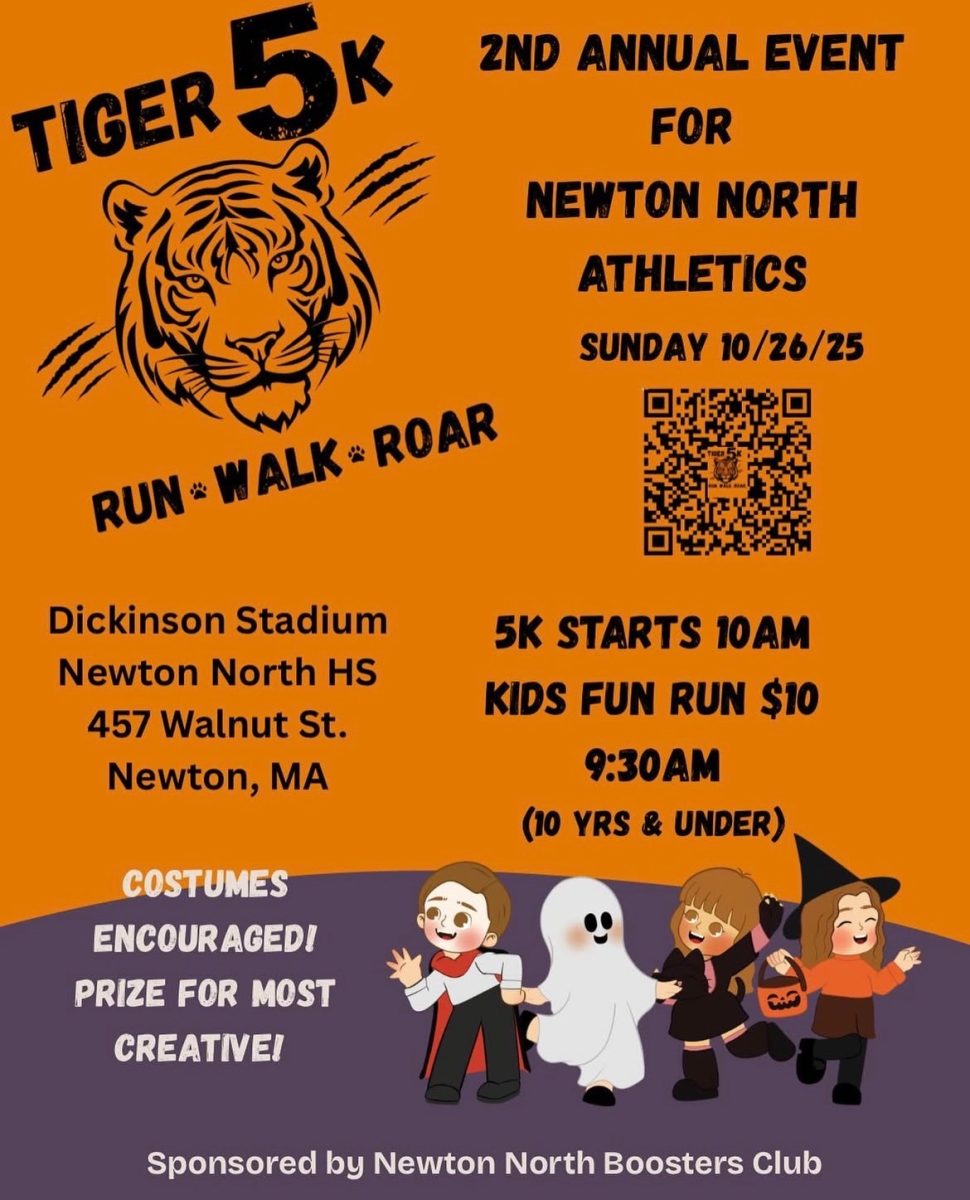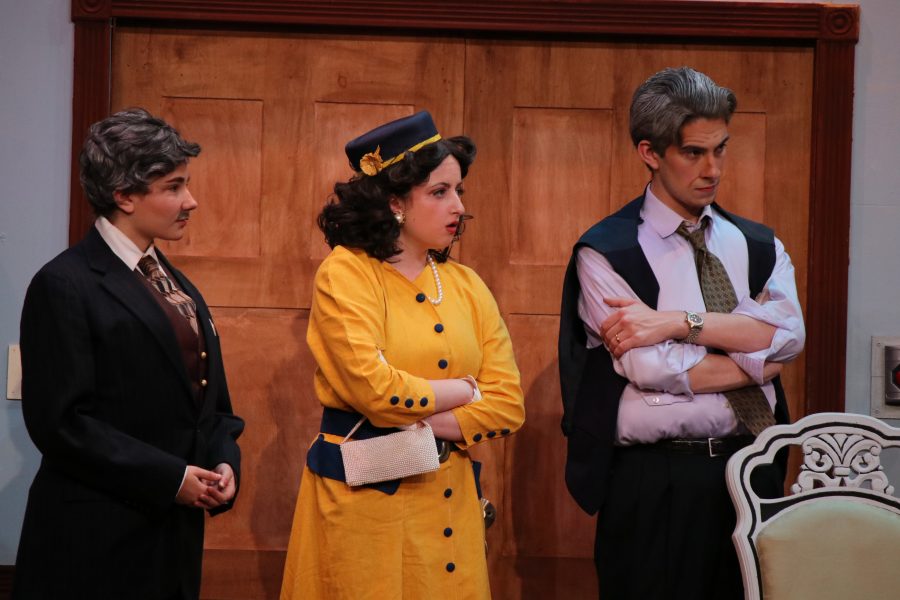The curtains opened on an idyllic scene. The bookshelves brimmed with books, a portrait stared serenely from the wall, the fire crackled gleefully, and an array of knickknacks were scattered about the room. The warm colors and low light of the stage, which was full of accurate details from the 1940s, conveyed a sense of calm, yet something darker lurked under the seemingly normal room, the setting for much of Theatre Ink’s production of Harvey.
Seniors Nick Scott and Josh Shub-Seltzer directed the production of Mary Chase’s Pulitzer prize winning play, Harvey, which ran May 24 through May 26 in the auditorium. The show revolves around Elwood P. Dowd, played by junior Evyatar Gershon, who believes himself to be best friends with an imaginary six-and-a-half foot tall rabbit named Harvey. Elwood’s sister, Veta Louise Simmons, played by senior Anastasia Foley, and Elwood’s niece, Myrtle Mae Simmons, played by sophomore Gabby Glass, attempt to commit him to a sanitarium. Their efforts result in a host of mix-ups, reversals, and revelations, all of which provide scathing commentary on gender roles, class, and mental health care during the 1940s.
While jokes and humor peppered the show, darkness emerged as the play continued, centering upon the themes of sanity, family dynamics, power, and who really belongs in a sanitarium.
“The show is really unique for the audience because it’s a comedy set in the 1940s, and there’s a lot of witty humor and satire,” said Foley.
The ambiguity surrounding the reality of Harvey’s existence brought forth a central concern of the play —who gets to determine who is sane and who isn’t? At the start of the play, Elwood’s insensitivity toward social cues and conversations with an imaginary rabbit made it easy to conclude that he was insane.
Yet, as the show continued, this conclusion became less clear. In act one, doors opened and closed while no one was onstage, eliciting the idea that perhaps not all of the unusual happenings were occurring in Elwood’s head.
Gershon’s strong acting accentuated the ambiguity of Harvey’s existence and made an obtuse and repetitive character a likeable one. His portrayal of Elwood’s politeness, readily offered compliments, and comfort in any situation made him eerily normal despite ignorance. The repetition of dialogue and gestures, while humorous, was also uncanny; Elwood again and again offered his card with his contact information to complete strangers, ignored social cues, and misunderstood common expressions. Gershon brought the character to life, inciting raucous laughter and, most likely, discomfort from the audience.
The wide cast of diverse characters also increased the humor and satire of the show. From uncaring, frivolous Myrtle Mae, held back from a glamorous life by her uncle’s eccentricites, to the bumbling, suave psychiatrist Dr. Lyman Sanderson, played by sophomore Filippo Menozzi, the characters delighted, amused, and elicited many a laugh and a cringe from the audience.
According to sophomore Téa Baum, who played patient Ethel Chauvenet and the cab driver, “The entire premise of the show is just laugh out loud funny, and there are so many wild and crazy characters to enjoy.”
She added, “I think it’s a great show for the student audience at North because it’s a really great light comedy with smart and clever humor.”
The psychiatrists’ follies in committing both Elwood and his mother, and then letting both out, criticized the mental care procedures of the 1940s. During the time period, as there was an inadequate understanding of mental health, many sane people were labeled insane simply for not adhering to social norms. Although this play ridicules the lacking mental health care systems of the 1940s the commentary is still relevant today.
According to Scott, Harvey is “a purposeful comedy. It’s a satirical social commentary on the norms of the 1940s and some of the meanings presented in the show, such as the theme of embracing differences, do transcend time and are applicable today.”
The play also satirized the hierarchies of social class. Characters that audiences might have generally viewed as intelligent and capable, such as the sanitarium’s psychiatrists, blundered their way through the show while lower class characters, like the cab driver, used solid logic and demonstrated a deeper understanding of the way the world works.
The realism of the production, which contributed to the power of the commentary, was enhanced by the highly impressive and detailed set.
During the three acts, the set changed, literally sliding from the calm and bookish living room to the sterile interior of the sanitarium. Small objects scattered around the sets, such as an antique telephone and an elaborate portrait on the wall, transported audiences into the 1940’s world of Elwood Dowd.
The accents and affected manners of the characters made the show even more realistic.
“The most challenging thing for me has been learning the transatlantic accent, which is basically a mix of British and American accents which was used in movies and on radio in the 1940s,” said Foley.
After hearing the cab driver’s stories of patients emerging from the sanitarium’s “curative” procedures angry and changed, the play ends with Elwood’s sister’s decision to prevent him from undergoing a procedure to cure him of his supposed insanity. Ultimately, Elwood’s family chooses to take him “as is,” with all his peculiarities, over a transformed Elwood without his characteristic love for life and people.
In the end, it is Elwood’s kindness and quirkiness that is important to his family overall, and they decide against the treatment, even if they must still endure Harvey. Although Elwood may be different, his family loves him. The broader message of the play concerned this importance of accepting differences.
Harvey was an entertaining night of comedy with deeper messages about the constructs that define daily life, leaving audiences pondering whether or not a six-and-a-half foot rabbit was imaginary after all.
Categories:
'Harvey' comments on mental illness, constructs of daily life
June 13, 2017
Donate to The Newtonite
More to Discover











































